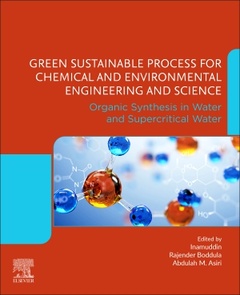Green Sustainable Process for Chemical and Environmental Engineering and Science Organic Synthesis in Water and Supercritical Water
Coordonnateurs : Inamuddin , Boddula Rajender, Asiri Abdullah M.

Green Sustainable Process for Chemical and Environmental Engineering and Science: Organic Synthesis in Water and Supercritical Water provides an in-depth review of purification and extraction methods for medicinal, analytical, engineering and bioactive compounds utilizing green chemistry protocols. It focuses on the synthesis of natural products and drugs, using industrial green solvents, water, supercritical water, and more. The book explores applications in organic synthesis and processing, including aqueous and non-aqueous promoted reactions. Aqueous media and supercritical water involved in organic synthesis are discussed for industrial use. Final sections cover green solvent assisted organic synthesis, such as addition, rearrangement, condensation, and more.
2. Oxidation and reduction reactions in water
3. Oxidation and reduction reactions in supercritical water
4. Micelle-assisted organic synthesis in water
5. Organic synthesis in aqueous vs non-aqueous media
6. Protection and deprotection reactions in water
7. Regioselective synthesis in water
8. Stereoselective organic synthesis in water
9. Stereospecific organic synthesis in water
10. Green organic synthesis in supercritical water
11. Addition-type reactions in water
12. Condensation reactions in water
13. Alkylation reactions in water
14. Ring-opening reactions in water
15. Value-added chemical synthesis in supercritical water
16. Organometallics synthesis in supercritical water
17. Allylation reactions in water
18. Olefin methasis in water
19. Phenolic compounds synthesis in water
20. Cycloadditions and Diels-Alder reactions in water
21. Fluoroorganics in water
22. Polymer synthesis in water and supercritical water
23. Heterocyclics synthesis in water
24. Hydrogenation reactions in water
25. Cyclodextrin-assisted organic synthesis in water
26. Biological-active organic synthesis in water
27. Catalyst-free organic synthesis in water
28. Multi component organic synthesis in water
29. Grignard reactions in water
30. C-H activation reactions in water
31. Carbohydrate synthesis in supercritical water
32. C-N formation reactions in water
33. Coupling reactions in water
34. Bio-fuel production in water
35. Halide synthesis in water
36. Employing green catalysis for organic synthesis in supercritical water
37. State of the art and perspectives of aqueous organic synthesis
Dr. Rajender Boddula is currently working as CAS-PIFI Fellow in the CAS Key Laboratory of Nanosystems and Hierarchical Fabrication, National Center for Nanoscience and Technology, Beijing, China. He has published many scientific articles in international peer-reviewed journals and has authored nine book chapters, and also serving as editorial board member and referee for reputed international peer-reviewed journals. His specialized areas of energy conversion and storage technologies, which include nanomaterials, graphene, polymer composites, heterogeneous catalysis, photoelectrocatalytic water splitting, biofuel cell, and supercapacitor applications
Prof. Abdullah M. Asiri is the Head of the Chemistry Department at King Abdulaziz University since October 2009 and he is the founder and the Director of the Center of Excellence for Advanced Materials Research (CEAMR) since 2010 till date. He is the Professor of Organic Photochemistry. His research interest covers color chemistry, synthesis of novel photochromic and thermochromic syste
- Provides a broad overview of green solvents for sustainable organic synthesis
- Compares water and supercritical water as green solvents vs. conventional solvents
- Outlines eco-friendly organic synthesis and chemical processes using water/supercritical water
- Includes industrial/pharmaceutical production development using water and supercritical water as solvents
- Outlines synthetic methods for polymers, drugs etc., using water and supercritical water as solvents
Date de parution : 06-2020
Ouvrage de 400 p.
19x23.3 cm
Thème de Green Sustainable Process for Chemical and Environmental... :
Mots-clés :
Aqueous media; Aqueous medium; Aqueous polymerization; Aqueous systems; Bioactive heterocycles; Catalysis; C-C; Cellulose hydrolysis; Controlled radical polymerization; Cross-coupling; Cycloaddition reactions; Enantioselective reactions; Epoxides; Free-radical polymerization; Green chemistry; Green solvents; Green synthesis; Heterocycles; Heterocyclic; Heterogeneous catalysis; Heterogeneous catalysts; Heterogeneous techniques; Homogeneous catalysts; Kinetic resolution; Lignocellulosic polymer; Magnetic catalyst; Microwave; Mizoroki-Heck; Multicomponent reactions; Nanocatalysis; Nanoparticles; Negishi; Organocatalysis; Polycondensation; Polymer science; Polymerization; RAFT agent; Rate enhancement; Regioselective synthesis; Ring-opening reactions; Solid-supported catalysts; Sonogashira; Stereoselectivity; Supercritical water; Suzuki-Miyaura; Ultrasound; Water; Water as solvent; Water chemistry; Water medium; Water reactions



